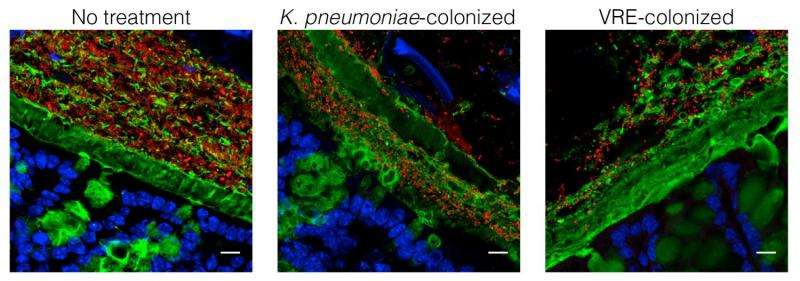Dangerous drug-resistant superbugs happily co-exist in the gut but can be eliminated by fecal transplants

The gut is an important reservoir for drug-resistant bacteria responsible for life-threatening hospital-acquired infections. A study in mice published on September 3rd in PLOS Pathogens reports that two of the most common antibiotic-resistant bacterial species circulating in hospitals occupy and effectively share the same location in the gut, and that they can be eliminated by fecal transplantation of a healthy gut microbiome.
Eric Pamer, from Memorial Sloan-Kettering Cancer Center in New York, USA, and colleagues, investigated the interactions between vancomycin-resistant Enterococcus faecium (VRE) and multi-drug resistant Klebsiella pneumoniae in the intestinal environment. Together, the two pathogens are responsible for about 10% of serious hospital-acquired infections in the US. Both can colonize the gut and spread from there, to the same or other patients, to cause localized or systemic infections.
Using a mouse model of intestinal colonization, the researchers first asked whether intestinal domination by either VRE or K. pneumonia would provide resistance against colonization by the other pathogen. They found that VRE and K. pneumoniae occupy the same intestinal sites and neither compete nor synergize with each other upon dense colonization of the mouse gut. While peacefully co-existing, the researchers found that the two pathogens differ with respect to stimulation and invasion of the colonic mucus, suggesting that they reside in distinct niches that satisfy their specific metabolic needs.
It is known that transplantation of feces from healthy mice can eliminate VRE from the intestine of densely colonized mice and, in humans, fecal transplantation from healthy donors can cure patients with certain pathogenic intestinal infections. To determine whether fecal transplantation can clear K. pneumoniae and concurrent VRE and K. pneumoniae infections, the researchers colonized mice with VRE and K. pneumoniae concurrently and then treated them with fecal microbiota transplants (FMT) or a sterile control solution on three consecutive days.
They found that VRE and K. pneumoniae levels were similar in the feces before FMT administration and remained elevated in mice that received the sterile control solution. In contrast, following FMT treatment, K. pneumoniae density in fecal pellets decreased within one day and became undetectable within 7 days in all mice. VRE, on the other hand, was cleared in 60% of the mice and reduced by a thousand-fold in the remaining 40%.
The researchers conclude that their findings "uncovered previously unrecognized features of VRE and K. pneumoniae colonization and provide insight into the nature of pathogen coexistence, dissemination and ways to eradicate colonization". "Current efforts", they say, "are focused on the identification of commensal bacterial species [i.e. the components of the healthy fecal transplant] that mediate clearance of antibiotic-resistant bacteria".
More information: Caballero S, Carter R, Ke X, Sušac B, Leiner IM, Kim GJ, et al. (2015) Distinct but Spatially Overlapping Intestinal Niches for Vancomycin-Resistant Enterococcus faecium and Carbapenem-Resistant Klebsiella pneumoniae. PLoS Pathog 11(9): e1005132. DOI: 10.1371/journal.ppat.1005132















